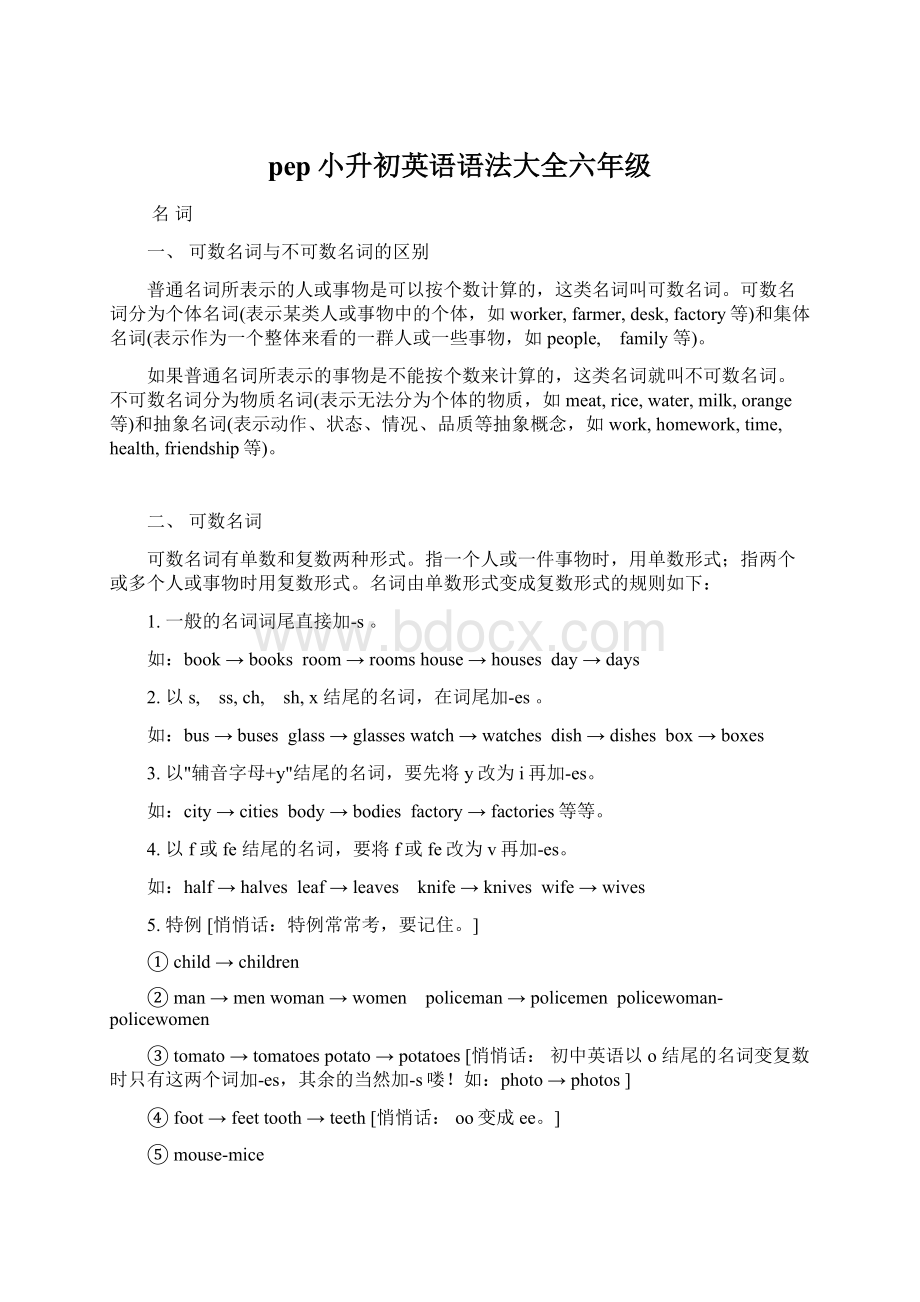pep小升初英语语法大全六年级Word文档格式.docx
《pep小升初英语语法大全六年级Word文档格式.docx》由会员分享,可在线阅读,更多相关《pep小升初英语语法大全六年级Word文档格式.docx(25页珍藏版)》请在冰豆网上搜索。

①child→children
②man→menwoman→women policeman→policemenpolicewoman-policewomen
③tomato→tomatoespotato→potatoes[悄悄话:
初中英语以o结尾的名词变复数时只有这两个词加-es,其余的当然加-s喽!
photo→photos]
④foot→feettooth→teeth[悄悄话:
oo变成ee。
⑤mouse-mice
⑥fish,sheep,Chinese,Japanese单、复数同形 [悄悄话:
变复数时词形不变。
⑦people单数形式表示复数意义,要求谓语动词用复数;
people的复数形式peoples通常指"
多个民族"
。
三、不可数名词
1.不可数名词没有复数,当它作句子的主语时,谓语动词要用单数形式。
Thefoodisveryfresh. 食品很新鲜。
2.有的不可数名词也可以作可数名词,有复数形式,但他们的意义发生变化。
water(水)→waters(水域)orange(橘汁)→oranges(橘子)
3.很多的不可数名词表示泛指时为不可数,表示种类时就可数,但意义大多不发生变化。
fruit→fruitsfood→foodsfish→fisheshair→hairs
写出下列各词的复数
I_________him_________this___________her______
watch_______child_______photo________diary______
day________foot________book_______dress________
tooth_______sheep______box_______strawberry_____
thief_______yo-yo______peach______sandwich______
man______woman_______paper_______
juice___________
water________milk________rice__________tea__________
***用所给名词的适当形式填空。
1.Howmany________(sheep)arethereonthehill?
2.Thereissome________(food)inthebasket.
3.Thebabyhasonlytwo________(tooth)now.
4.Thereisalotof________(water)inthebottle.
5.Therearefive________(people)inhisfamily.
6.Let'
stake________(photo),OK?
7.Ihavelotsof________(tomato)here.
8.The________(leaf)onthetreeturn-yellow.
9.The________(child)areplayinggamesontheplaygroundnow.
10.Their________(dictionary)looknew.
11.Iseeyouhaveafewwhite________(hair).
12.Theyare________(woman)doctors.
13.Canyougivemesomebottlesof____(orange),please?
14.Therearemany________(fox)inthepicture.
15.Iwouldlikesomeapple________(juice).Iamverythirsty.
一般现在时
一般现在时的功能
1.表示经常性或习惯性的动作,常与always,often,usually,everyday,sometimes等连用。
Igetupatsixeveryday.我每天六点起床。
2.表示客观事实。
Theearthgoesaroundthesun.地球绕着太阳转。
3.用在格言或谚语中。
Knowledgeispower.知识就是力量。
一般现在时的构成
1.be动词:
陈述句:
主语+be(am,is,are)+其它。
Iamaboy.我是一个男孩。
否定句:
主语+be+not+其它。
Heisnotaworker.他不是工人。
一般疑问句:
Be+主语+其它。
-Areyouastudent?
-Yes.Iam./No,I'
mnot.
特殊疑问句:
疑问词+一般疑问句。
Whereismybike?
2.行为动词:
主语+行为动词(+其它)。
WestudyEnglish.我们学习英语。
当主语为第三人称单数(he,she,it)时,要在动词后加"
-s"
或"
-es"
MarylikesChinese.玛丽喜欢汉语。
主语+don'
t(doesn'
t)+动词原形(+其它)。
Idon'
tlikebread.
当主语为第三人称单数时,要用doesn'
t构成否定句。
Hedoesn'
toftenplay.
Do(Does)+主语+动词原形+其它。
Doyouoftenplayfootball?
Yes,Ido./No,Idon'
t.
当主语为第三人称单数时,要用does构成一般疑问句。
Doesshegotoworkbybike?
Yes,shedoes./No,shedoesn'
Howdoesyourfathergotowork?
第三人称单数动词+s的变化规则
1.一般情况下,直接加-s,如:
cook-cooks,milk-milks
2.以s.x.sh.ch.o结尾,加-es,如:
guess-guesses,wash-washes,watch-watches,go-goes
3.以“辅音字母+y”结尾,变y为i,再加-es,如:
study-studies
一般现在时练习:
一、写出下列动词的第三人称单数
drink________go_______stay________make________look_________have_______
pass_______carry____come________
watch______plant_______fly________
study_______brush________do_________teach_______
二、用括号内动词的适当形式填空。
1.Heoften________(have)dinnerathome.
2.DanielandTommy_________(be)inClassOne.
3.We_________(notwatch)TVonMonday.
4.Nick_________(notgo)tothezooonSunday.
5.________they__________(like)theWorldCup?
6.What_________theyoften_________(do)onSaturdays?
7._________yourparents_________(read)newspaperseveryday?
8.Thegirl_________(teach)usEnglishonSundays.
9.SheandI__________(take)awalktogethereveryevening.
10.There__________(be)somewaterinthebottle.
11.Mike_________(like)cooking.
12.They_________(have)thesamehobby.
13.Myaunt_________(look)afterherbabycarefully.
14.Youalways_________(do)yourhomeworkwell.
15.I_________(be)ill.I’mstayinginbed.
16.She_________(go)toschoolfromMondaytoFriday.
17.LiuTao_________(do)notlikePE.
18.Thechildoften_________(watch)TVintheevening.
19.SuHaiandSuYang_________(have)eightlessonsthisterm.
20.-Whatday_________(be)ittoday?
-It’sSaturday.
三、按照要求改写句子
1.DanielwatchesTVeveryevening.(改为否定句)
___________________________________________________
2.Idomyhomeworkeveryday.(改为一般疑问句,作否定回答)
________________________________________________________
____________________________
3.Shelikesmilk.(改为一般疑问句,作肯定回答)
_______________________________________________________
4.Amylikesplayingcomputergames.(改为一般疑问句,作否定回答)
____________________________________
5.Wegotoschooleverymorning.(改为否定句)
6.HespeaksEnglishverywell.(改为否定句)
7.Iliketakingphotosinthepark.(对划线部分提问)
8.JohncomesfromCanada.(对划线部分提问)
9.Sheisalwaysagoodstudent.(改为一般疑问句,作否定回答)
________________________________
10.SimonandDaniellikegoingskating.(改为否定句)
五、改错(划出错误的地方,将正确的写在横线上)
1.IsyourbrotherspeakEnglish?
__________________
2.Doeshelikesgoingfishing?
3.Helikesplaygamesafterclass.
4.Mr.WuteachsusEnglish.
5.Shedon’tdoherhomeworkonSundays._________________
一般过去时
1.一般过去时的功能
(1)表示过去某个时间发生的动作或存在的状态。
Wevisitedourunclelastweek.上周我们探望了我们的叔叔。
(2)一般过去时也表示过去经常或反复发生的动作。
IwatchedTVeverydaylastmonth.上个月我每天都看电视。
常和表示过去的时间状语连用
表示过去的时间状语
1、yesterday
Yesterday,thedaybeforeyesterday,yesterdayevening
2、last
lastnight,last+时间(lastweek,lastmonth,lastyear)
3、ago
amomentago(=justnow),longlongago,“一段时间+ago”表示“……前”。
threedaysago”
4、这一组,是考试常考的,需要特别记忆!
thismorning,whenIwasfiveyearsold,in+过去时间词(in1998),onceuponatime(很久以前)
2.Be动词在一般过去时中的变化:
⑴am和is在一般过去时中变为was。
⑵are在一般过去时中变为were。
⑶带有was或were的句子,其否定、疑问的变化和is,am,are一样,即否定句在was或were后加not(wasnot=wasn’t,werenot=weren’t),一般疑问句把was或were调到句首。
3.句中没有be动词的一般过去时的句子
didn’t+动词原形,如:
Jimdidn’tgohomeyesterday.
在句首加did,句子中的动词过去式变回原形。
DidJimgohomeyesterday?
⑴疑问词+did+主语+动词原形?
WhatdidJimdoyesterday?
⑵疑问词当主语时:
疑问词+动词过去式?
Whowenttohomeyesterday?
动词过去式变化规则:
1.一般在动词末尾加-ed,如:
pull-pulled,cook-cooked
2.结尾是e加d,如:
taste-tasted
3.末尾只有一个元音字母和一个辅音字母的重读闭音节,应双写末尾的辅音字母,再加-ed,如:
stop-stopped
4.以“辅音字母+y”结尾的,变y为i,再加-ed,如:
study-studied
过去时练习
写出下列动词的过去式
is\am_________fly_______plant________are________
drink_________play_______go________make________
does_________dance________worry________ask_____
taste_________eat__________draw________put______
throw________kick_________pass_______do
________
Be动词的过去时练习
(1)
一、用be动词的适当形式填空
1.I_______atschooljustnow.
2.He________atthecamplastweek.
3.We________studentstwoyearsago.
4.They________onthefarmamomentago.
5.YangLing________elevenyearsoldlastyear.
6.There________anappleontheplateyesterday.
7.There________somemilkinthefridgeonSunday.
8.Themobilephone_______onthesofayesterdayevening.
二、句型转换
1.Itwasexciting.
________________________________________________
____________________________________________
肯、否定回答:
__________________________________________
2.Allthestudentswereveryexcited.
否定句:
3.Theywereinhispocket.
Be动词的过去时练习
(2)
一、用be动词的适当形式填空
1.I______anEnglishteachernow.
2.She_______happyyesterday.
3.They_______gladtoseeeachotherlastmonth.
4.HelenandNancy________goodfriends.
5.Thelittledog_____twoyearsoldthisyear.
6.Look,there________lotsofgrapeshere.
7.There________asignonthechaironMonday..
8.Today_____thesecondofJune.Yesterday______thefirstofJune.It_____Children’sDay.Allthestudents______veryexcited.
二、句型转换
1.Therewasacarinfrontofthehousejustnow.
三、中译英
1.我的故事书刚才还在手表旁边。
___________________________________________________________
2.他们的外套上个礼拜放在卧室里了。
3.一会以前花园里有两只小鸟。
行为动词的过去时练习
(1)
一、用行为动词的适当形式填空
1.He_________(live)inWuxitwoyearsago.
2.Thecat______